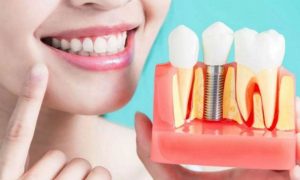Dental Clinic | Ang Mo Kio, Bedok, Jurong East, Tampines – Dental Implants & Oral Care Singapore
Comprehensive guide to Dental Implants
Comprehensive guide to Dental Implants

Missing teeth can be an embarrassing situation for anyone, and for the worst-case scenario, they can make daily life uncomfortable with issues that affect your social life, speech, ability to chew and even confidence. However, that is easily solvable with dental implants being the gold standard to replace missing teeth. That does not mean you should rush to book a dental implant procedure right away, it is better to consult your dentist first to make an informed decision. That being said, the guide is here just to give you an overall understanding of what dental implants entails.
What is dental implants?
To start with, it is important you know a dental implant is just an artificial replacement of a missing natural tooth. It consists of these components:
Implant screw
It is commonly known as a fixture which is essentially an artificial tooth root that will be placed into the jawbone way beneath your gums. Usually with it being a medical grade titanium and a screw-like design, it can be firmly fixed to your jaw.
Implant connector
With a hexagon or octagon shape, it carries out these functions:
- Supporting and securing the implant crown
- Retain its superstructure
Implant tooth
Also known as the crown, it is the tooth-like part of the implant. With a design like a natural tooth, it is make of ceramic or metal.
In summary, the success of your implant procedure will depend on how well these 3 components integrate with one another and with your jawbone and gums.
Am I a good candidate for dental implants?
Most people are generally good candidates for dental implants. The success of your dental implants really depends on whether you:
- are in good general health,
- have good oral hygiene,
- have healthy gums with enough bone to anchor the implant(s),
- Are not suffering from parafunctional habits like severe bruxism,
- have a good balanced and well-aligned bite.
Despite that, it will also depend on the surgeon’s competency and skills in these areas:
- indications and contraindications,
- treatment planning,
- identifying risks,
- managing potential complications
- executing proper surgery and treatment.
One should not only only be mindful of success factors but risk factors which include but not limited to:
- Chronic diseases that affect the patient’s ability to heal – diabetes, immune deficiencies, osteoporosis, etc
- People who have had radiation/chemotherapy to the head and neck
- Smoking
- History of moderate to severe gum disease such as periodontitis
- Significant bone loss and gum loss due to disease.
- Parafunction such as severe bruxism
- Severely imbalanced and mal-aligned occlusion (bite)
Furthermore, the dental surgeon should have already examined in detail your dental and medical history and current condition to ensure your suitability for the dental implant procedure.
How long do dental implants last? Will I need it replaced overtime?
With proper care and maintenance, dental implants can last for a longtime. With that said, dental implant fixtures are designed to last a lifetime. On the other hand, dental implant crowns typically last around 10 years or more. However, the longevity of implants is best in patients who:
- do not have parafunction lichas nocturnal bruxism
- have a stable and balanced bite
- are able to always keep a high level of oral hygiene
- haveregulardentalcheckups
- have good general health
- do not smoke
- have good gum health
In Addition to the host factors, it is also important to note that the longevity of the implants can also be affected by:
- the correctness of the implants 3-dimensional surgical placement,
- the design of the abutment, implant crown, and material used.
Hence, the skill and experience of the dental surgeon can also significantly contribute to the longevity of dental implants.
How can I get the best results immediately after dental implant surgery?
For the best results immediately after dental implant surgery, my general advice would be as follows:
- Maintain Meticulous Oral Hygiene and wound care.
- Follow Post-op instructions strictly.
- Take all medications prescribed.
- Avoid Subjecting The Implant to excessive biting forces.
- Go for all scheduled post-op review appointments with your dental surgeon.
- Visit your dental surgeon as soon as possible if you notice any unusual smell, discharge, or symptoms.
How can you find the best dentist in Singapore for dental implants?
For starters, it’s important that you shortlist some dental surgeons with relevant training and qualifications. You can also ask friends and family for word-of-mouth recommendations to a dental surgeon with experience in dental implant surgery.
There is no such thing as a dental implant specialist. However, there are 3 specialists in Singapore that undergo structured training in dental implant surgery. It Will Be Part Of Their Specialist Programme. To list, they are:
1) Periodontist – also known as gum specialist
2) Prosthodontist – also known as “missing teeth” specialist
3) Oral and maxillofacial surgeon
In Summary
Dental implants can be a good option for you if your missing teeth negatively affects your social life, speech, confidence, and ability to chew. This procedure can be really expensive, hence, you must do extensive research first. Every one has a unique set of teeth and gums, thus, what works for others may not work for you. It is still recommended that you consult a dental surgeon to confirm if the procedure is suitable for you.
feel free to contact us at 1728 Dental via email:
1728 Dental@AMK: +65 9631 1728
1728 Dental@Jurong East: +65 9770 1728
1728 Dental@Tampines: +65 9725 1728
Alternatively, you may WhatsApp us at:

















